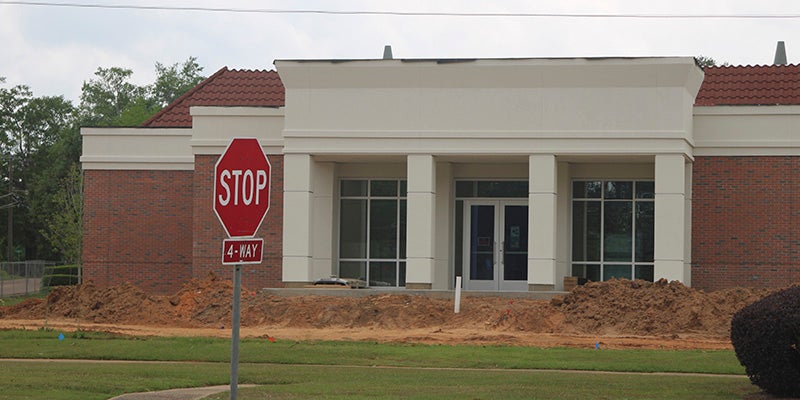PRCC shares plans for student promotion, graduation
Published 7:00 am Saturday, April 18, 2020

- nearly complete: The new math and science building at Pearl River Community College is showing signs of progression. Cathy Cook | Picayune Item
Pearl River Community College has been conducting all classes online since the first shelter in place order was issued by Mississippi Governor Tate Reeves at the beginning of April, and most summer courses are planned to be offered exclusively online as well, said Candace Harper, Associate Vice-President for Marketing and Communications.
With Reeves extending his order until April 27, all PRCC campuses will remain closed.
The dorms have also been closed since the shelter in place order went into effect. Most students were already out of the dorms at that point, said Harper. Dorms are not expected to be reopened for the summer semester at the end of May, but will be open in the fall if it is safe to do so, said Harper.
Most of the college’s workers are doing work from home.
“I’m proud of the resiliency that’s been shown by our faculty, our staff and our students for getting us through this tough time,” said PRCC President Adam Breerwood.
Online learning
Even programs that require hands on learning, like nursing or physical therapy, are holding classes digitally. The college has invested in a simulation system that allows nursing students to complete clinical lab learning online, said Harper. Still, offering technical learning during the pandemic has been a challenge.
“There will be some students that will have to meet face to face,” said Breerwood.
As soon as the shelter in place order is lifted, the college will facilitate small group learning to get those students the face to face time they need, said Breerwood. Even if instructors or administrators have to be on campus seven days a week, or a week or two past the regular end of the semester, the faculty will do whatever it needs to allow students to complete their courses, said Breerwood.
The college has made contingency plans in case students in technical education programs are unable to complete coursework by May, which is usually when finals are held, said Harper. Currently the college expects most students will be able to finish the semester and have their grades submitted within the regular time frame, said Breerwood.
As part of the transition to online education, the college provided Chromebooks to students who needed them, said Harper.
Expanding online learning has been part of the college’s long term plan, said Breerwood, but the pandemic has accelerated the college’s efforts to achieve that goal. Expanding online learning will make the college more accessible to students who may be working full time or have children, said Breerwood.
“This has shown us that we really need to give it a high priority right now and we’ve done so and will continue to do so,” he said.
Finishing the semester
“We want students to know that they are going to graduate, whatever that may look like, they will get their diploma,” said Harper.
The May 2020 graduation ceremony is being postponed, and a new date has not been announced yet. Students who already ordered caps and gowns will still be able to use them when the ceremony is held. The deadline for ordering caps and gowns has also been extended.
“At this point we feel like everyone will be able to graduate or finish the spring semester,” said Harper. “We do not feel like there’s going to be a lot of overlap into the summer semester.”
To the summer and beyond
Registration for fall and summer courses is open. The process for registration has been a little slower than normal because advisors are meeting with students digitally instead of in person to go over program requirements, said Harper.
The college is offering a scholarship contest for students who register for classes by April 24. The college will give out two half tuition scholarships based on a random drawing for students who register by the deadline.
The mandatory freshmen orientation held in the summer will be online for the summer of 2020, said Harper.
Although the college has expanded its capacity for online learning, many students are still eager to return to a physical classroom, said Breerwood. Of the 700 students on the dorm waitlist, only one has said they are interested in continuing their education online instead of coming back to the physical campus in August, he said.
“Some people around the country are saying this is going to change the face of education forever, and I think it will to some point, but I don’t think Pearl River Community College will ever get away from the traditional college environment,” said Breerwood.
Federal funding and revenue
PRCC has been allocated money from the federal CARES Act.
The funding is in two parts: one that will go directly to students and one that will be used to assist the college with the cost of moving online and the financial impact of the pandemic.
The college has already applied for the funds to assist students and is waiting for it to come in.
Not all students qualify for the financial assistance from the CARES Act, like students who were already doing 100 percent of their learning online or high school students participating in dual enrollment, said Breerwood. Those guidelines were set by the federal government, and the college is still working to figure out who qualifies for assistance.
The pandemic has presented revenue challenges since the bookstore is closed, athletic programs have stopped and camps scheduled to come to the campus were cancelled, said Breerwood. The biggest challenge may come at the state level, he said. If the economy slows, then less revenue will come from the state. However, he does not expect a tuition increase.
“We do have challenges ahead of us, but those challenges should not be placed on the backs of our students,” said Breerwood. “If we try to put our financial loss on the backs of our students, that won’t do anything for our local economy. So we’re going to try to do everything we can to combat that and find other resources and other ways to collect revenue at this time.”
Resources
The college has a call center and online chat option to answer questions or offer assistance. The call and chat volume have both decreased by 50 percent, said Harper, which means many students are transitioning to online learning without issue.
Students should be receiving updates from the college via their student email address, said Harper.
The college has online resources available to students, including a FAQ page with answers that are updated daily, said Harper. Email addresses for all of the departments are also available on the college’s website, along with guidance on using the library digitally and workout videos to help students maintain their health.



